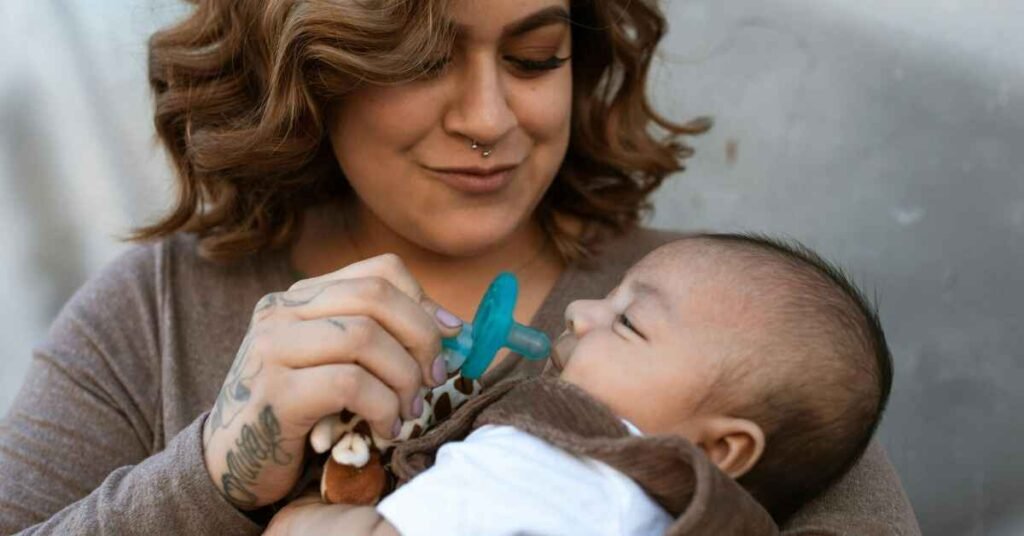
About pacifiers, many parents are curious. Are they harmful to infants or not? We examine the advantages and disadvantages of using pacifiers in this post. You’ll know at the conclusion if a pacifier is appropriate for your child.
A pacifier: what is it?
A pacifier is a little object with a nipple-like form. It is constructed from silicone, plastic, and rubber. Pacifiers are used by babies as comfort. They are widely used by parents to comfort wailing infants.
The Advantages of Pacifiers

1. Calms Infants
Sucking is a natural urge for babies. Pacifiers provide for this necessity. It helps soothe them and lessen fussiness.
2. Encourages Rest
A pacifier makes it easier for many babies to fall asleep. Sucking is a helpful strategy for nighttime since it helps children relax.
3. Could Reduce SIDS Risk
Some studies suggest that using a pacifier during sleep may reduce the risk of Sudden Infant Death Syndrome (SIDS). However, always follow safe sleep guidelines. 4. Offers Pain Reduction
Babies who are having unpleasant procedures or minor diseases sometimes find solace in pacifiers. They can divert their attention from their discomfort by sucking.
When to Give a Pacifier to a Child
Waiting until breastfeeding is established—typically after three to four weeks—is advised by most experts. Some newborns may become confused and have difficulty nursing if a pacifier is offered too early.
Selecting the Appropriate Pacifier
Take these things into account when choosing a pacifier:
• Material: Select secure materials such as rubber or silicone. These materials don’t hurt a baby’s lips.
• Size: Choose the appropriate size for the age of your child. Please refer to the box as pacifiers come in different sizes.
• Form: A few pacifiers are made with dental health in mind. In order to encourage correct dental alignment, look for orthodontic forms.
Risks of Using a Pacifier
Although pacifiers provide advantages, there are also some risks:
1. Dental Problems
Dental issues may arise from prolonged use. A youngster who uses a pacifier for extended periods of time may have misaligned teeth. After age 2, cut back on usage to lower dangers.
2. Dependency
Some infants grow unduly reliant on their pacifiers. Their inability to sleep without one could make it more difficult to wean them later.
3. Obstacles in Breastfeeding
Nursing may be impacted by the premature introduction of a pacifier. Lower milk production may result from babies preferring to use the pacifier.
4. Elevated Danger of Otitis Media
There is evidence from certain research that using a pacifier increases the risk of ear infections. An older infant or toddler is more at risk for this.
Tips for Safe Use of Pacifiers

If you decide to give a pacifier to your baby, bear in mind the following safety advice:
• BPA-Free: Verify that the pacifier is devoid of dangerous substances like BPA. Seek out secure labeling.
• Clean Often: Before giving your baby a pacifier, make sure it’s clean and sterile. To get rid of the bacteria, boil it or sterilize it.
• Examine for Damage: Continually look for signs of wear on the pacifier. If there are any indications of damage, replace it.
• Steer Clear of cables: To prevent choking hazards, do not fasten the pacifier to strings or cables.
Ways to Stop Using a Pacifier
Here are some pointers to assist with the weaning process if your child is pacifier dependent:
1. Gradual Decrease
Start by restricting the use of pacifiers to nighttime and naps. Reduce how often they use it gradually.
2. Provide substitutes
Offer solace goods such as blankets or plush toys. These may serve as a pacifier substitute.
3. Positive Reinforcement
When your child stops using their pacifier, give them praise. Provide modest incentives to motivate them.
4. Exercise patience
It takes time to wean. At first, your youngster might not comply. At all times, maintain your composure and kindness.
Pacifier and Dental Health
Parents often worry about how pacifiers affect teeth. Here’s what to know:
- Orthodontic Options: Look for pacifiers that promote healthy tooth alignment. These designs are better for long-term use.
- Limit After Age 2: As children’s mouths grow, reduce the amount of time they spend using pacifiers after age 2.
- Routine Dental Exams: Make an appointment for your child to see a dentist. Dentists can keep an eye on any problems arising from pacifier use.
The Use of Pacifiers and the Development of Speech

A common worry among parents is that pacifiers could impede the development of speech. According to studies, this is what:
• Use Moderately: It’s normally acceptable to use a pacifier on occasion. Usually, it doesn’t cause speech delays.
• Promote Talking: Restrict the usage of pacifiers during the day. This helps babies practice speaking aloud.
• Have Conversations: Talk to your child frequently. Singing and reading help children’s language development.
In summary
For parents, pacifiers can be a useful tool. They offer solace and could lower the chance of SIDS. But think about the possible drawbacks. Concerns about breastfeeding, reliance, and dental health are legitimate.
Take your baby’s needs into consideration while choosing to use a pacifier. Select a good and safe pacifier. If you intend to wean your child off of it, take your time and be patient.
Remember, each infant is unique. It’s crucial to figure out what works best for you and your child. Make wise decisions and relish your journey as a parent!
FAQs About Pacifiers
1. Are pacifiers safe for newborns?
Yes, pacifiers are safe for newborns. Just make sure they are BPA-free and suitable for your baby’s age.
2. How long can a baby use a pacifier?
It’s best to limit pacifier use after age 2 to avoid dental problems and dependency.
3. Can pacifiers help with teething?
Yes, pacifiers can soothe babies during teething. The act of sucking provides comfort.
4. How do I clean a pacifier?
Clean the pacifier by boiling it in water or using a sterilizer. Always wash it before giving it to your baby.
5. What if my baby won’t take a pacifier?
Not all babies like pacifiers. If your baby refuses, try again later or explore other comfort options.














